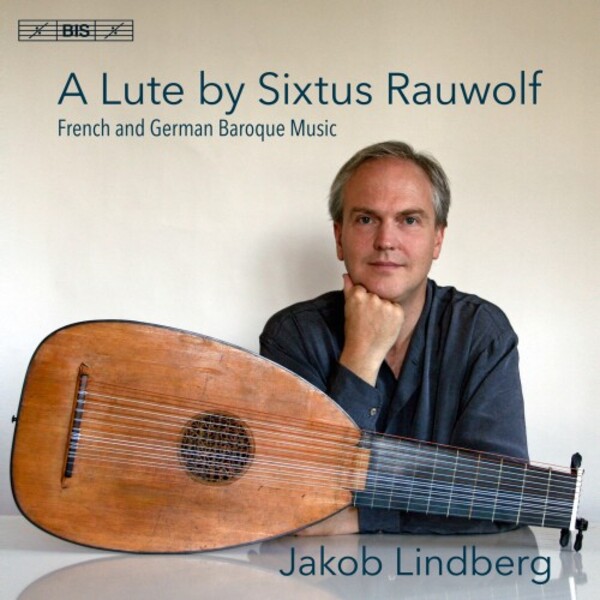
A Lute by Sixtus Rauwolf: French and German Baroque Music
£13.25
In stock - available for despatch within 1 working day
Despatch Information
This despatch estimate is based on information from both our own stock and the UK supplier's stock.
If ordering multiple items, we will aim to send everything together so the longest despatch estimate will apply to the complete order.
If you would rather receive certain items more quickly, please place them on a separate order.
If any unexpected delays occur, we will keep you informed of progress via email and not allow other items on the order to be held up.
If you would prefer to receive everything together regardless of any delay, please let us know via email.
Pre-orders will be despatched as close as possible to the release date.
Label: BIS
Cat No: BIS2265
Format: Hybrid SACD
Number of Discs: 1
Genre: Instrumental
Release Date: 27th October 2017
Contents
Works
AllemandeCourante 'La Superbe'
Courante
Gigue
Prelude
Sarabande
Auserlesene Lauten-Stucke (1747)
Canaries 'Le Mouton'
Courante 'La Changeante'
Gaillarde 'La Bizarre'
Menuet 'La Ganbade'
Prelude 'La promenade'
Sarabande 'La Malassis'
Partie a 4 in F sharp minor (lamento)
Padoana
Suite in A major
Artists
Jakob Lindberg (lute)Works
AllemandeCourante 'La Superbe'
Courante
Gigue
Prelude
Sarabande
Auserlesene Lauten-Stucke (1747)
Canaries 'Le Mouton'
Courante 'La Changeante'
Gaillarde 'La Bizarre'
Menuet 'La Ganbade'
Prelude 'La promenade'
Sarabande 'La Malassis'
Partie a 4 in F sharp minor (lamento)
Padoana
Suite in A major
Artists
Jakob Lindberg (lute)About
For German lutenists from about the middle of the seventeenth century, it was France that provided the aesthetic and musical model, and towards the end of the century, when the lute rather suddenly and inexplicably dropped out of fashion in Paris certain French luthistes travelled abroad and met with great success in German-speaking lands. With them, they took their music and special traditions of lute-playing, evidence of which can be seen in the music of several of the German composers included here.
The disc closes with a suite of pieces by Silvius Leopold Weiss, the most famous lutenist of the baroque era. Weiss, Lindberg and the Rauwolf lute first crossed paths in 2006 on a highly acclaimed all-Weiss disc (BIS1524): ‘Too good to be true’ was the verdict in International Record Review while the reviewer in Goldberg Magazine wrote: ‘As an evocation of the lute's magical qualities, this deserves to achieve cult status’.
Reviews
 Lindberg’s Sixtus Rauwolf lute was built in Augsburg around 1590 as a seven- or eight-course instrument. In 1715 it was altered and became the 11-course instrument it is today. As Tim Crawford writes in his superb booklet note, Lindberg has chosen works ‘that could plausibly have formed part of the repertory of an owner of the instrument at around the time of its final conversion’. ... He is stately and expressive in Reusner’s Padoana while seizing upon the extravagant trills and strums evoked by the Dufault and the elegant deportment of the Mouton. Lindberg similarly relishes the toccata-like textures, bittersweet harmonies and melodic attractiveness of Kellner, ‘Mr Pachelbel’ and Weiss, though it is in the latter’s Sarabande and Ciacona that Lindberg’s mastery of this repertoire is at its most convincing – and moving. William Yeoman
Lindberg’s Sixtus Rauwolf lute was built in Augsburg around 1590 as a seven- or eight-course instrument. In 1715 it was altered and became the 11-course instrument it is today. As Tim Crawford writes in his superb booklet note, Lindberg has chosen works ‘that could plausibly have formed part of the repertory of an owner of the instrument at around the time of its final conversion’. ... He is stately and expressive in Reusner’s Padoana while seizing upon the extravagant trills and strums evoked by the Dufault and the elegant deportment of the Mouton. Lindberg similarly relishes the toccata-like textures, bittersweet harmonies and melodic attractiveness of Kellner, ‘Mr Pachelbel’ and Weiss, though it is in the latter’s Sarabande and Ciacona that Lindberg’s mastery of this repertoire is at its most convincing – and moving. William Yeoman
Error on this page? Let us know here
Need more information on this product? Click here